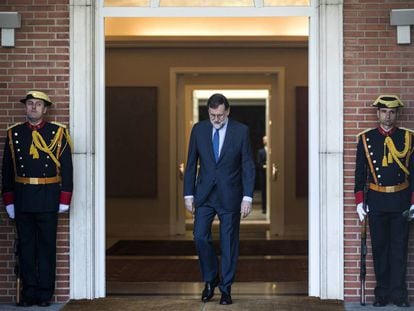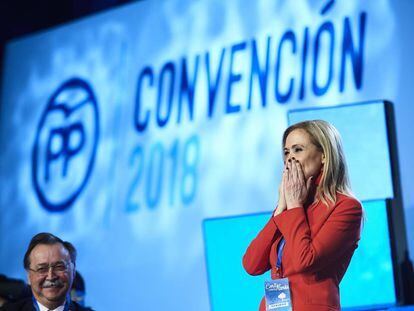Governing Popular Party and its ex-treasurer, sentenced in massive corruption case
Spain’s High Court gives businessman at center of so-called “Gürtel” probe, Francisco Correa, 51 years in jail, while Luis Bárcenas gets 33-year term
/cloudfront-eu-central-1.images.arcpublishing.com/prisa/LKQ247NED2FCGZEWUG2AMSRDTI.jpg)
Judges overseeing the main trial in the so-called Gürtel case, the largest probe into political corruption in Spain’s democratic history, have sentenced the main ringleaders to several decades in prison.
Spain’s High Court, the Audiencia Nacional, has slapped Gürtel mastermind Francisco Correa with 51 years in jail for heading a corrupt network that worked with party officials in Popular Party (PP)-run governments between 1999 and 2006. The case got its name from the German word for correa, which means “belt” in Spanish.
Bárcenas will have to serve 33 years in prison and pay a fine of more than €44 million
The court also found former PP treasurer Luis Bárcenas guilty of evading more than €11.5 million in taxes between 2000 and 2009, and of taking €1.24 million in bribes in exchange for facilitating public contract awards to business figures who were introduced to him by Correa.
Bárcenas will have to serve 33 years in prison and pay a fine of more than €44 million for these crimes. The former treasurer has played a major role in unveiling the scandal. In June 2013, he told the investigating judge that he had kept secret ledgers related to a party slush fund, and that the orders came down from the current and past presidents and general secretaries of the party, reaching back to 1982.

Bárcenas claimed that he continued with the secret accounts until 2009, when the scandal broke following his implication in the Gürtel contracts-for-kickbacks corruption case.
In a 1,687-page judgment, the court finds 29 out of the 37 defendants guilty of a wide range of crimes, from taking bribes to document forgery, embezzlement, money laundering, influence peddling and more.
Political reaction
"The response to today's ruling should be a no-confidence motion by the opposition. We are ready to support [Socialist leader] Pedro Sánchez if he puts it forward. Democracy cannot tolerate criminals at the helm of our government," said Iglesias, whose party is the third-largest force in Congress.
Senior officials from the main opposition Socialist Party (PSOE) said they will meet on Friday morning to analyze the political situation following the ruling.
"There will be a before and an after in Ciudadanos' relations with the government for the remainder of the political term, following the Gürtel ruling," said Albert Rivera, the leader of Ciudadanos, a party whose support has been crucial to Rajoy's minority government. Ciudadanos, which is currently leading voter intention polls, has taken a significant chunk of voters away from the PP partly through its message of zero tolerance for corruption.
In January 2013, EL PAÍS published the Bárcenas ledgers, which record cash contributions and donations made by businessmen, and alleged bonus payments to top party officials.
Bárcenas’s wife, Rosalía Iglesias, has also been sentenced to 15 years in prison. Investigators believe this could have an effect on Bárcenas’ willingness to disclose more details of the PP’s internal finances, which he suggested he might do after being placed in pre-trial detention in June 2013 and spending 19 months at Soto del Real penitentiary in Madrid.
The ex-wife of Correa, Carmen Rodríguez Quijano, has been given 14 years and eight months in jail.
In a two-to-one vote, the three-judge panel also found that the PP as a legal entity benefited financially from Gürtel’s corrupt practices. It has been sentenced to pay €245,492.
Mariano Rajoy testified in court over Gürtel, thus becoming the first serving prime minister of Spain to testify in a criminal case
The same goes for Ana Mato, a former health minister who must now return €27,857, representing the amount of money that Gürtel spent on trips and gifts for her family. The gifts were not bestowed to Mato herself, who is not thought to have been directly involved in Gürtel, but to her ex-husband Jesús Sepúlveda, the former mayor of Pozuelo de Alarcón (Madrid), who has been sentenced to 14 years in prison over Gürtel.
In July of last year, Mariano Rajoy testified in court over the Gürtel case, thus becoming the first serving prime minister of Spain to testify in a criminal case.
The far-reaching Gürtel case engulfed 37 business and political figures with ties to the PP, and it has dogged the ruling party for years, becoming the largest corruption scandal in a series that also includes the Púnica case.
More recently, the Madrid branch of the PP was rocked by a scandal that ultimately forced regional premier Cristina Cifuentes to step down. On Tuesday Eduardo Zaplana, a former PP minister in the government of José María Aznar, was arrested on allegations of money laundering.
The latest voter intention survey by the pollster Metroscopia for EL PAÍS shows 19.1% support for the PP, nearly half what it was in late 2016.
English version by Susana Urra.












































